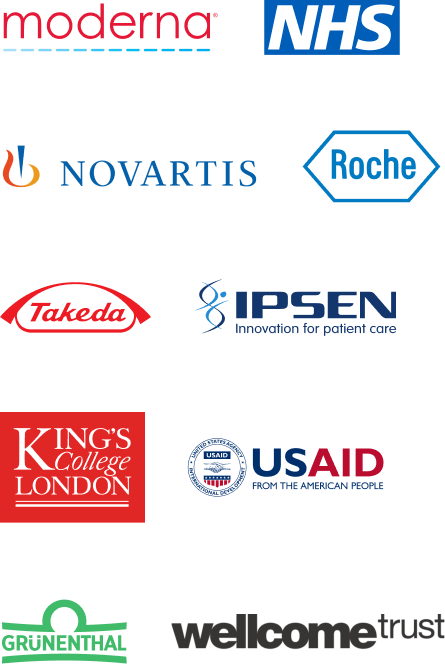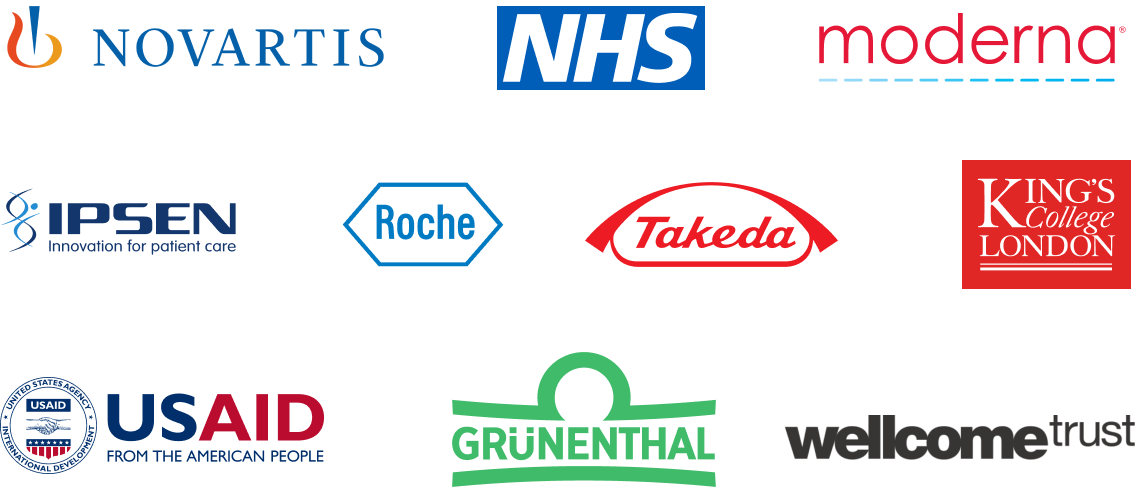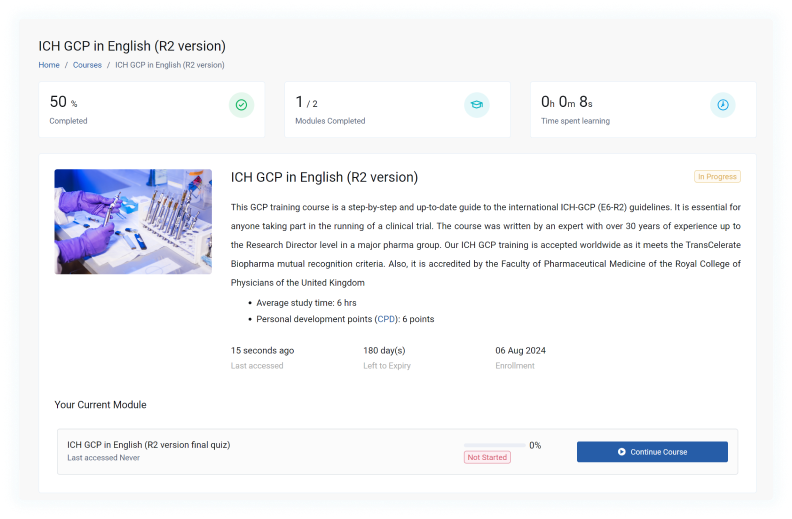Course Syllabus
- Using the training materials
- The History of GCP - pt 1
- The History of GCP - pt 2
- What is GCP?
- Why should we have ICH-GCP? (Mini-exam)
- The Principles of ICH GCP
- Some General Points
- Documentation and Version Control
- Quality Assurance
- The specifics of GCP in Australia
- Other Resources
- Introduction to GCP (Webinar)
- Introduction
- Responsibilities of the CA (TGA)
- Responsibility of the HREC
- What needs to be checked?
- Subject Informed Consent Forms (ICF) I
- Subject Informed Consent Forms (ICF) II
- Composition, Functions, Operations, Procedures and Records
- Introduction
- Investigator Responsibilities
- Investigator Qualifications and Agreements
- Adequate Resources
- Medical Care of Trial Subjects I
- Medical Care of Trial Subjects II
- Communication with HREC/IRB
- Compliance with the Protocol
- Investigational Medicinal Product
- Randomization Procedures and Un-blinding
- Informed Consent I
- Informed Consent II - Consent Discussion
- Informed Consent III - Pregnant Women
- Informed Consent IV - Subjects who Cannot Read or Write
- Informed Consent V - Children and young people
- Informed Consent VI - People in unequal or dependent relationships
- Informed Consent VII - Subjects with mental impairment
- Informed Consent VIII - Subjects highly dependent on medical care
- Informed Consent IX - Subjects who may be involved in illegal activities
- Informed Consent X - Aboriginal and Torres Strait Islander peoples
- Informed Consent XI - People in other countries
- Informed Consent XII - Updating consent
- Records and Reports I
- Records and Reports II - Study Site Files
- Records and Reports III
- Records and Reports IV
- Records and Reports V - Financial Information and Contracts
- Records and Reports VI - The Case Record Form (CRF)
- Records and Reports VII - Recording Subject Data
- Premature Termination or Suspension of a Trial
- Progress Reports and Final Report(s) by Investigator
- Archiving
- Introduction
- Quality Management I
- Quality Management II
- QA and QC (Quality Assurance and Quality Control) I
- QA and QC (Quality Assurance and Quality Control) II - Standard Operating Procedures
- QA and QC (Quality Assurance and Quality Control) III - Agreements and Contracts
- Contract Research Organisations I
- Contract Research Organisations II
- Trial Design
- Trial Management and Data Handling I - Trial Management
- Trial Management and Data Handling II
- Trial Management and Data Handling III - Data Management
- Trial Management and Data Handling IV - Electronic Data Systems
- Record Keeping
- Investigator Selection I
- Investigator Selection II
- Investigator Selection III - Allocation of Responsibilities
- Investigator Selection IV - Compensation to Subjects and Investigators
- Financing
- Notification/ Submission to Regulatory Authorities
- Gaining TGA approval for Australian trials
- Gaining CA approval in the EU
- Confirmation of Review by HREC/IRB
- Information on IMP
- Manufacturing, Packaging, Labelling and Coding Investigational Products I
- Manufacturing, Packaging, Labelling and Coding Investigational Products II
- Supplying and Handling Investigational Products
- Record Access
- Audit and Inspection
- Noncompliance
- Premature Termination or Suspension of a Trial
- Clinical Trial/Study Reports
- Multicentre Trials
- Introduction
- Monitoring
- Monitor Responsibilities
- The Monitoring Visit
- Verifying IMP
- Complying with the Protocol
- Verifying Informed Consent
- The CRF and Source Documents
- Verifying Subject Data
- Errors in CRFs
- Closing out the Monitoring Visit
- The Monitoring Report & Plan
- Quality Management - Centralized Monitoring
- Fraud and Misconduct
- Introduction
- Adverse Events (AE)
- Adverse Reactions (ARs)/Adverse Drug Reactions (ADR)
- Reference Safety Information (RSI)
- Safety Critical Adverse Events
- Serious Adverse Event (SAE)/Serious Adverse Reaction (SAR)
- Significant Safety Issue (SSI)
- Suspected Unexpected Serious Adverse (SUSAR)
- Unexpected Adverse Reaction (UAR)
- Urgent Safety Measure (USM)
- Adverse Event Decision Tree
- Sponsor Responsibilities I
- Sponsor Responsibilities II - SUSAR Reporting
- Sponsor Responsibilities III - SSIs & USMs
- Sponsor Responsibilities IV - Annual Report
- Principal Investigator Responsibilities
- HREC Responsibilities
- Institution Responsibilities
- TGA Responsibilities
- Safety Reporting Flowchart
- Introduction
- Protocol Structure and Content
- Introduction
- Investigator Brochure Structure and Content
- Essential Documents
- Archiving
- Documents to be Present Pre-Study
- Documents to be Added During the Study
- Documents to be Added Post-Study
- Glossary & Abbreviations
- Useful Reference Documents List
Our GCP certified customers


Good Clinical Practice (GCP) training is a vital educational programme designed to equip clinical trial professionals and researchers with the necessary knowledge of ethical and scientific standards essential for conducting high-quality clinical studies. This comprehensive course covers the globally recognised guidelines set forth by the International Council for Harmonisation (ICH).
The key objectives of GCP training include:
- Safeguarding the rights, safety, and well-being of human participants
- Upholding the integrity and reliability of clinical trial data
- Fostering consistent, top-tier practices across all facets of clinical research
Whitehall Training’s Good Clinical Practice Course thoroughly explores these crucial areas, offering learners a robust grounding in both the theoretical principles and practical applications of GCP. Our course is meticulously crafted to ensure that participants gain a thorough understanding of these critical concepts, enabling them to apply this knowledge effectively in their professional roles within the clinical research field.
For individuals aiming to take part in clinical trials research, obtaining GCP certification is essential.
However, even if you're simply keen to broaden your knowledge of the clinical research landscape, GCP certification offers significant benefits:
- It demonstrates your understanding of global research standards
- It boosts the reliability and calibre of your research endeavours
- It upholds the rights and wellbeing of trial participants
- It can open up new career opportunities within clinical research
Our Good Clinical Practice course goes beyond mere certification. It provides you with hands-on, practical knowledge that you can directly apply to your work in the field. By completing our course, you'll gain a comprehensive understanding of GCP principles and how to implement them effectively in real-world scenarios.
Good Clinical Practice (GCP) certification is crucial for a broad spectrum of individuals involved in clinical research:
- Lead Researchers and Co-investigators: Those directly responsible for overseeing and conducting clinical trials at research facilities.
- Research Support Teams: This includes study coordinators, clinical research nurses, and other on-site personnel who play a vital role in managing trial operations.
- Trial Sponsors and Research Organisations: Individuals in charge of planning, initiating, and reporting on clinical trials.
- Regulatory Bodies: Officials tasked with monitoring and assessing trial compliance with established standards.
- Ethics Committees and Review Boards: Members who evaluate and approve trial protocols to ensure ethical conduct.
- University and Research Centre Staff: Those ensuring that institutional research meets international benchmarks.
- Government-Funded Researchers: All staff and investigators participating in clinical trials supported by government grants.
Our Whitehall Training Good Clinical Practice Course is tailored to address the needs of this diverse group, offering both universal GCP principles and role-specific guidance. It's also an excellent resource for professionals aiming to enhance their research capabilities and streamline their clinical trial processes.
Our GCP training programme thoroughly covers the ICH-GCP (E6-R2) international guidelines, ensuring you meet the necessary requirements to participate in global clinical trials. We've designed this course as a comprehensive, up-to-date guide to these crucial guidelines, making it an essential resource for anyone involved in clinical trial management.
The course content has been crafted by an industry veteran with over three decades of experience, including time as a Research Director in a major pharmaceutical company. This wealth of knowledge translates into practical insights that go beyond mere theoretical understanding.
We're proud to offer this course in multiple languages, including English, German, Bulgarian, French, Italian, Japanese, Polish, Portuguese, Russian, and Spanish. This diversity allows professionals from various linguistic backgrounds to access high-quality GCP training.
One of the standout features of our course is its clear, visually engaging format. We've designed it to facilitate easy cross-referencing with the ICH-GCP E6 document, enhancing your learning experience and practical application of the material.
The course's quality is further validated by its accreditation from the Faculty of Pharmaceutical Medicine of the Royal College of Physicians of the United Kingdom. Upon completion, participants earn 6 CPD points, contributing to their professional development.
For those requiring region-specific knowledge, we've developed tailored versions of the course that align with the regulatory frameworks in several countries and regions, including Australia, the UK, the US, France, Germany, and Latin America.
By choosing our GCP course, you're not just ticking a box for compliance; you're investing in a rich, practical understanding of Good Clinical Practice that will serve you well throughout your career in clinical research.
Indeed, our Good Clinical Practice (GCP) course has received certification from a prestigious institution. The Faculty of Pharmaceutical Medicine, which operates under the auspices of the Royal College of Physicians, has granted our course its seal of approval. This organisation has been at the forefront of establishing and maintaining exacting standards in pharmaceutical research since its inception in 1989.
The Faculty's endorsement serves as a testament to the quality and rigour of our course content. It assures participants that the training they receive aligns with the most up-to-date industry benchmarks and academic criteria. Consequently, upon completion, you'll obtain a qualification that is well-regarded across the pharmaceutical and clinical research sectors.
This certification underscores our commitment to delivering top-tier education in Good Clinical Practice, ensuring that you're equipped with knowledge that meets the highest professional standards.
The price of GCP certification can fluctuate based on several key aspects:
- Official recognition: Has the course received approval from respected industry bodies?
- Global acceptance: Does the certification meet international standards, allowing participation in worldwide clinical trials?
- Content relevance: Is the material current and developed by industry professionals?
- Availability: For how long can students access the course materials?
Our Whitehall Training GCP course is priced at £79, reflecting its high quality and comprehensive offering:
- Recognised qualification: The course carries accreditation from the Royal College of Physicians, awarding 6 CPD points.
- Internationally accepted: Completion enables participation in clinical trials, in line with ICH E6(R2) guidelines.
- Expert-led content: Developed by our GCP specialist, Lucy Parker, who brings over ten years of experience managing research across major institutions, including the NHS.
- Unlimited access: We support ongoing professional development by providing lifelong access to course resources.
For team bookings, we offer a 10% discount on purchases of 5 licences at checkout. If you're interested in larger group discounts, please contact our team directly.
Indeed, there are some no-cost options available for those looking to gain a basic understanding of Good Clinical Practice (GCP). However, it's important to consider the following points when evaluating these free alternatives:
- Content quality and currency: Many free resources may not be up-to-date with the latest regulations and best practices in clinical research.
- Limited depth: Free courses may not cover the comprehensive content required for those actively involved in clinical trials.
- Lack of certification: Most free courses do not provide an official qualification upon completion.
Whitehall Training's GCP course offers a deep dive into the essential principles and practices needed for conducting ethical and scientifically robust clinical trials. Our programme is structured to cater to both newcomers and experienced professionals, featuring a range of modules that progress from fundamental concepts to more complex topics.
The curriculum encompasses a wide array of crucial subjects, including:
- The historical context and core tenets of Good Clinical Practice
- Defining the duties of key stakeholders such as investigators, sponsors, and monitors
- Navigating ethical considerations and the intricacies of informed consent
- Crafting and adhering to robust protocols
- Managing safety concerns and reporting adverse events
- Ensuring data integrity and implementing quality management systems
- Navigating regulatory landscapes and interacting with authorities
- Maintaining essential documentation and proper record-keeping
- Proper handling of investigational medicinal products
- Effective site management and monitoring techniques
Our course employs a variety of engaging e-learning methods to ensure an immersive and productive learning experience. These include:
- In-depth instructional materials
- Authentic case studies drawn from real-world scenarios
- Engaging knowledge assessments and quizzes
- Practical examples that illustrate best practices
- Prompts for personal reflection and practical application of knowledge
This comprehensive approach ensures that participants gain not just theoretical knowledge, but also practical insights that can be applied directly to their roles in clinical research.
Securing your GCP certificate involves a simple two-stage process:
- Work through the interactive educational content provided in our course.
- Successfully complete the online assessment at the end of the programme.
Feeling apprehensive about the GCP exam? There's no need to worry. The assessment is merely a formality to confirm your readiness for research participation. If you don't pass on your first attempt, you can easily revisit our comprehensive resource library to reinforce your understanding of any areas that need improvement. You're then welcome to retake the exam at your convenience.
Our Whitehall Training Good Clinical Practice Course is designed to make this process as smooth and informative as possible, ensuring you're well-prepared for both the exam and your future role in clinical research.
Our Good Clinical Practice course is structured to ensure participants not only absorb the material but can effectively implement it in real-world clinical research environments. The course employs a multi-faceted assessment approach:
- Continuous Evaluation: As learners progress through the modules, they encounter interactive quizzes and scenario-based exercises. These serve to solidify key concepts and provide learners with immediate feedback on their comprehension.
- Comprehensive Final Assessment: The course concludes with an all-encompassing exam that rigorously evaluates the learner's understanding of GCP principles and practices. This assessment covers all crucial areas explored in the course, including:
- Ethics in clinical research
- Regulatory compliance and requirements
- Key roles and their responsibilities in clinical trials
- Ensuring data integrity and managing quality
- Handling safety reports and adverse events
- Real-world Application: The final assessment incorporates questions designed to test the learner's ability to apply GCP principles to lifelike clinical trial situations.
To ensure participants are thoroughly prepared for their roles in clinical trials, obtaining GCP certification requires successful completion of the final assessment.
Recognising that learning occurs at different paces, learners can attempt the final assessment as many times as needed. This approach ensures that every participant achieves the necessary level of understanding to become GCP qualified.
Our Good Clinical Practice course is crafted to be accessible and beneficial for a diverse range of professionals in the clinical research field. Whilst a fundamental grasp of clinical research can be advantageous, it's not essential for enrolment. We've carefully structured the content to cater to various levels of expertise and roles within the clinical trial ecosystem.
This training proves particularly useful for:
- Research Coordinators in clinical settings
- Lead and Co-investigators
- Nurses specialising in research
- Professionals managing clinical trials
- Those handling data and conducting biostatistical analysis
- Specialists in regulatory affairs
- Experts in quality assurance
- Members serving on ethics committees
- Pharmacists engaged in clinical trial work
- Personnel from sponsoring organisations and Contract Research Organisations (CROs)
Whether you're embarking on your journey in clinical research or seeking to update your existing knowledge, our course offers a thorough exploration of Good Clinical Practice principles and their real-world application. The flexible design ensures that both newcomers and seasoned professionals can derive significant value from the material presented.
Yes, our Good Clinical Practice course is fully online, providing learners with unparalleled convenience and adaptability. This digital format offers numerous benefits:
- Personalised learning speed: Students can navigate the course content at their own rhythm, aligning with their unique learning preferences and timetables. This approach fosters a more thorough understanding of the material without the constraints often associated with traditional classroom settings.
- Unrestricted accessibility: The course can be accessed round-the-clock from any internet-enabled device. Whether you're at your workplace, in the comfort of your home, or on the move, the course materials are always at your fingertips.
The International Council for Harmonisation, or ICH, plays a crucial role in shaping global pharmaceutical research standards, including Good Clinical Practice (GCP). Here are some essential points about ICH:
- It's a collaborative body that unites regulatory authorities and pharmaceutical industry experts.
- ICH develops and maintains internationally accepted guidelines for clinical trials.
- The organisation's GCP guidelines are centred on safeguarding trial participants and ensuring the integrity of collected data.
- These guidelines undergo periodic revisions, with ICH GCP E6(R2) being the most recent iteration.
Compliance with ICH guidelines is mandatory for conducting legitimate clinical trials worldwide. Our Good Clinical Practice course is designed to thoroughly cover all 13 fundamental ICH GCP principles, equipping you with the knowledge needed to conduct research that meets these global standards. By delving into these principles, our course ensures you're well-prepared to navigate the complexities of clinical research in accordance with international requirements.
ICH Good Clinical Practice E6 (R2) represents the latest iteration of the Good Clinical Practice guidelines, published in 2016 by the International Council for Harmonisation of Technical Requirements for Pharmaceuticals for Human Use. This update marks a pivotal shift in GCP standards, adapting to the evolving landscape of clinical research.
It's essential for clinical research professionals to be well-versed in ICH GCP E6 (R2) for several reasons:
- It sets the contemporary global benchmark for ethical and scientifically robust clinical trials.
- Regulatory bodies across the world often mandate adherence to these guidelines.
- It plays a crucial role in safeguarding human participants and ensuring the integrity of trial data.
- Many research institutions and pharmaceutical companies expect their teams and collaborators to be knowledgeable about and follow these updated guidelines.
The Whitehall Training Good Clinical Practice course provides comprehensive coverage of ICH GCP E6 (R2). Our aim is to equip learners with a thorough understanding of these updated guidelines, enabling them to implement them effectively in their clinical research endeavours. Moreover, the course offers additional insights into how these guidelines apply specifically to the Australian context, providing learners with a more tailored understanding of GCP implementation in this region.
The International Council for Harmonisation's Good Clinical Practice (ICH GCP) framework is underpinned by 13 essential principles that establish the ethical and scientific benchmarks for clinical research. These crucial principles encompass:
- Ethical behaviour in research
- Ensuring benefits surpass risks
- Safeguarding participants' rights and well-being
- Providing comprehensive supporting information
- Developing scientifically robust protocols
- Obtaining IRB/IEC endorsement
- Ensuring qualified medical oversight
- Engaging competent investigators
- Securing informed consent
- Maintaining precise data documentation and reporting
- Preserving confidentiality
- Adhering to good manufacturing practices for investigational products
- Implementing quality assurance systems
The Whitehall Training Good Clinical Practice Course offers a thorough exploration of these principles. Our programme is designed to equip you with a comprehensive understanding of how to effectively implement these guidelines in practical clinical research scenarios. By delving into each principle in detail, we ensure that you're well-prepared to navigate the complexities of modern clinical trials whilst maintaining the highest standards of ethical and scientific rigour.

